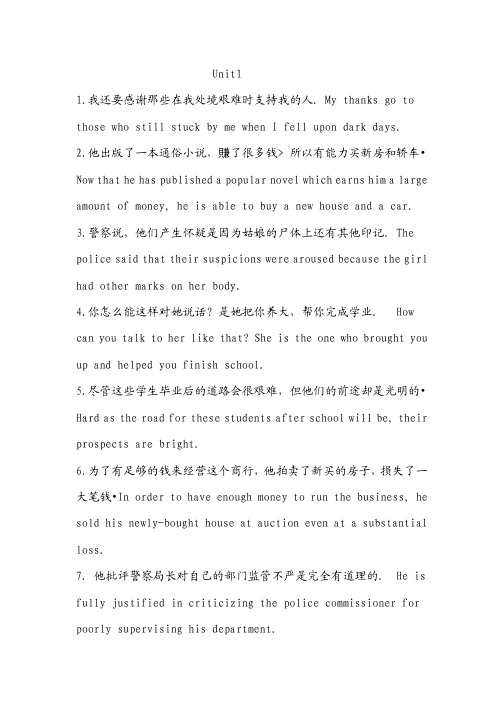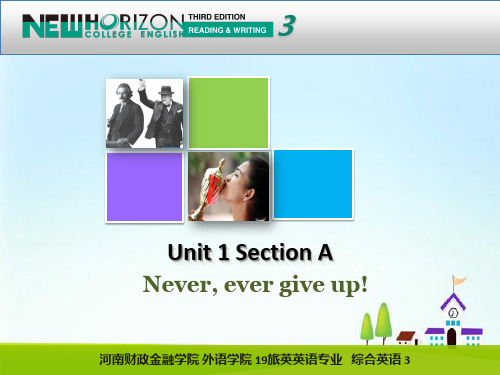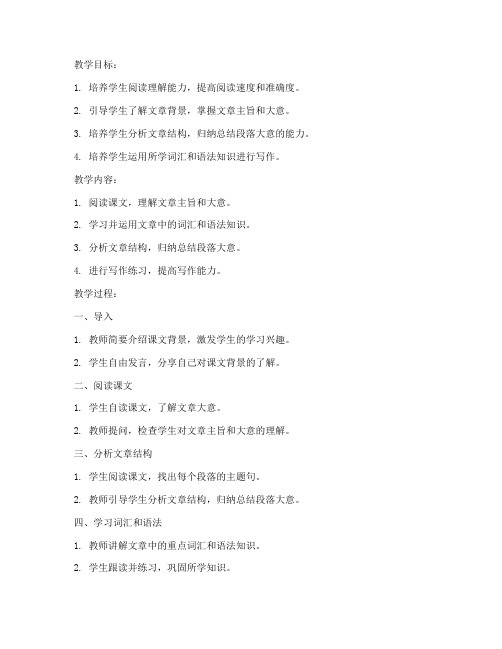新视野大学英语第三册unit1
- 格式:doc
- 大小:103.50 KB
- 文档页数:11

Unit11.我还要感谢那些在我处境艰难时支持我的人. My thanks go to those who still stuck by me when I fell upon dark days.2.他出版了一本通俗小说,賺了很多钱> 所以有能力买新房和轿车•Now that he has published a popular novel which earns him a large amount of money, he is able to buy a new house and a car.3.警察说,他们产生怀疑是因为姑娘的尸体上还有其他印记. The police said that their suspicions were aroused because the girl had other marks on her body.4.你怎么能这样对她说话?是她把你养大,帮你完成学业. How can you talk to her like that? She is the one who brought you up and helped you finish school.5.尽管这些学生毕业后的道路会很艰难,但他们的前途却是光明的•Hard as the road for these students after school will be, their prospects are bright.6.为了有足够的钱来经营这个商行,他拍卖了新买的房子,损失了一大笔钱•In order to have enough money to run the business, he sold his newly-bought house at auction even at a substantial loss.7. 他批评警察局长对自己的部门监管不严是完全有道理的. He is fully justified in criticizing the police commissioner for poorly supervising his department.8.为吸引外宾,这些受保护的古代建筑被修复得很漂亮. These ancient buildings which are under protection have been restored beautifully to attract foreigners.1.On Saturday night at The Grouse’s Nest, they’re still willing to raise a glass or two to “Lord Williams", though now his title prompts laughter. 周六晚,在“牢骚酒吧”,村民依旧乐意向“威廉斯勋爵”祝酒,尽管这个头衔现在只能引来阵阵笑声。




教学目标:1. 培养学生阅读理解能力,提高阅读速度和准确度。
2. 引导学生了解文章背景,掌握文章主旨和大意。
3. 培养学生分析文章结构,归纳总结段落大意的能力。
4. 培养学生运用所学词汇和语法知识进行写作。
教学内容:1. 阅读课文,理解文章主旨和大意。
2. 学习并运用文章中的词汇和语法知识。
3. 分析文章结构,归纳总结段落大意。
4. 进行写作练习,提高写作能力。
教学过程:一、导入1. 教师简要介绍课文背景,激发学生的学习兴趣。
2. 学生自由发言,分享自己对课文背景的了解。
二、阅读课文1. 学生自读课文,了解文章大意。
2. 教师提问,检查学生对文章主旨和大意的理解。
三、分析文章结构1. 学生阅读课文,找出每个段落的主题句。
2. 教师引导学生分析文章结构,归纳总结段落大意。
四、学习词汇和语法1. 教师讲解文章中的重点词汇和语法知识。
2. 学生跟读并练习,巩固所学知识。
五、写作练习1. 教师给出写作题目,要求学生运用所学知识进行写作。
2. 学生独立完成写作,教师巡视指导。
六、课堂小结1. 教师总结本节课所学内容,强调重点和难点。
2. 学生回顾所学知识,提出疑问。
七、课后作业1. 复习课文,掌握文章主旨和大意。
2. 预习下一课,为下一节课做好准备。
教学评价:1. 课堂表现:观察学生在课堂上的发言、互动情况,评价其学习态度和参与度。
2. 阅读理解:通过提问、讨论等方式,评价学生对文章主旨和大意的理解程度。
3. 词汇和语法:通过学生的跟读、练习,评价其对词汇和语法知识的掌握程度。
4. 写作能力:通过学生的写作练习,评价其写作能力。
教学反思:1. 本节课是否达到了教学目标?2. 学生在课堂上的表现如何?3. 教学方法是否合适?4. 如何改进教学效果?备注:1. 教师应根据学生的实际情况调整教学内容和进度。
2. 注重培养学生的阅读兴趣和自主学习能力。
3. 鼓励学生积极参与课堂活动,提高课堂氛围。

Unit 1 The Way to SuccessSection A1 Understanding the text.1 He achieved fame for his wit, wisdom, civic duty, and abundant courage.2 They were thought to be slow learners in childhood, but they overcame their childhood difficulties and made magnificent discoveries that benefit the entire world today.3 His strong will.4 It means to keep their focus on achieving a positive end result, instead of letting small problems get in the way of good results.5 Because they have the will to overcome profound obstacles and to work diligently in the pursuit of their goals, and have the passion for success.6 Because firms preferred to hire less qualified men rather than risk hiring a female lawyer, which was unprecedented.7 We should never give up on our dream, and one day we can change the world and make it a better place.8 The secret of success is built upon a burning inward desire---a robust, fierce will and focus---that fuels the determination to act, to keep preparing, to keep going even when we are tired and fail.2 Critical thinking1 You may have tried and failed many times before you finally get success. But it does notmatter. What matters is whether you can summon up(鼓起)all your courage again and again to face the hardships standing in the way of success.2 Luck, talent, good relationships with your colleagues, etc.3 When I have realized that I am pursuing something that is hard to achieve, I would try to stick to the goal. But l will begin to think of what I can do to improve the situation. When it still doesn't work, I would try to analyze what the problem is and then make some changes and probably reset my goal. Yes, sometimes we are pursuing the wrong goal which can never be achieved, only to find ourselves in deep frustration and profound fatigue. In this situation, I may give up the wrong goal and set up another goal that is achievable.4 Following the guidance of senior people.●Getting sound advice from our parents.●Setting a correct goal.●Achieving success step by step.●Developing good interpersonal relationships.Language focus3 Words in usel whereby 2 pursuit 3 inhibit 4 maintain 5 patriotic 6 transcended 7 endeavors 8 dedication 9 prestige 10 nominate4 Word buildingWords learned New words formed-antinhabitant inhabitparticipate participantattend attendantpollute pollutantdescend descendantcontest contestanttolerate tolerantresult resultant-fulneglect neglectfulresource resourcefulboast boastfulrespect respectful5l resultant 2 tolerant 3 pollutants 4 inhabited 5 contestants 6 descendants 7 attendants 8 respectful 9 participants 10 neglectful11 resourceful 12 boastful6 Banked cloze1 F2 G3 H4 J5 E6 A7 N8 I9 K l0 M7 Expressions in usel removed from 2 failed in 3 in the pursuit of 4 deviated from 5 precludes; from 6triumph over 7 work their way into 8 written off9 Translation世界公民是指一个人承认自己是新兴的全球社区的一分子,而且其行动对全球社区的价值打造和实践活动有所贡献。
Two kinds of judgment1 There are two different ways people judge you. Sometimes judging you correctly is the end goal. But there's a second much more common type of judgment where it isn't. We tend to regard all judgments of us as the first type. We'd probably be happier if we realized which are and which aren't.2 The first type of judgment, the type where judging you is the end goal, includes court cases, grades in classes, and most competitions. Such judgments can of course be mistaken, but because the goal is to judge you correctly, there's usually some kind of appeals process. If you feel you've been misjudged, you can protest that you've been treated unfairly.3 Nearly all the judgments made on children are of this type, so we get into the habit early in life of thinking that all judgments are.4 But in fact there is a second much larger class of judgments where judging you is only a means to something else. These include college admissions, hiring and investment decisions, and of course the judgments made in dating. This kind of judgment is not really about you.5 Put yourself in the position of someone selecting players for a national team. Suppose for the sake of simplicity that this is a game with no positions, and that you have to select 20 players. There will be a few stars who clearly should make the team, and many players who clearly shouldn't. The only place your judgment makes a difference is in the borderline cases. Suppose you screw up and underestimate the 20th best player, causing him not to make the team, and his place to be taken by the 21st best. You've still picked a good team. If the players have the usual distribution of ability, the 21st best player will be only slightly worse than the 20th best. Probably the difference between them will be less than the measurement error.6 The 20th best player may feel he has been misjudged. But your goal here wasn't to provide a service estimating people's ability. It was to pick a team, and if the difference between the 20th and 21st best players is less than the measurement error, you've still done that optimally.7 It's a false analogy even to use the word unfair to describe this kind of misjudgment. It's not aimed at producing a correct estimate of any given individual, but at selecting a reasonably optimal set.8 One thing that leads us astray here is that the selector seems to be ina position of power. That makes him seem like a judge. If you regard someone judging you as a customer instead of a judge, the expectation of fairness goes away. The author of a good novel wouldn't complain that readers were unfair for preferring a potboiler with a racy cover. Stupid, perhaps, but not unfair.9 Our early training and our self-centeredness combine to make us believe that every judgment of us is about us. In fact most aren't. This is a rare case where being less self-centered will make people more confident. Once you realize how little most people judging you care about judging you accurately—once you realize that because of the normal distribution of most applicant pools, it matters least to judge accurately in precisely the cases where judgment has the most effect—you won't take rejection so personally.10 And curiously enough, taking rejection less personally may help you to get rejected less often. If you think someone judging you will work hard to judge you correctly, you can afford to be passive. But the more you realize that most judgments are greatly influenced by random, extraneous factors—that most people judging you are more like a fickle novel buyer than a wise and perceptive magistrate—the more you realize you can do things to influence the outcome.11 One good place to apply this principle is in college applications. Most high school students applying to college do it with the usual child's mix of inferiority and self-centeredness: inferiority in that they assume that admissions committees must be all-seeing; self-centeredness in that they assume admissions committees care enough about them to dig down into their application and figure out whether they're good or not. These combine to make applicants passive in applying and hurt when they're rejected. If college applicants realized how quick and impersonal most selection processes are, they'd make more effort to sell themselves, and take the outcome less personally.两种判断判断一个人有两种不同的方式,有时判断的最终目的是正确地判断一个人,不过另外一种则不是如此,并且这种判断要常见得多。
Unit 1 The way to successObjectivese the key expressions to talk about the way to success2.apply the reading skill --understanding denotation and connotation3.write a passage following the structure of an expository essay4.translate attributive clauses5.develop a right attitude toward successSection A Never, ever give up!Lead-inWatch the video clip and discuss the following questions in pairs.1. What factors lead to success according to the speaker?The three things that lead to success are as follows: passion, work, good.2. Can you name several other important factors for success?There are other important factors for success: good luck, talent, a clear goal, good relationship with your colleagues, self-confidence, etc.Inspiring your thoughtsTask 1Global understanding of the introductionRead Paras. 1-2 and answer the following questions.•What is the main idea of this part?It introduces the theme question of the text: What is the secret of success?•Whose example is used to elicit the idea?The example of Winston Churchill.Task 2 Global understanding of the body (Paras. 3-7)Step 1 Read Paras.3-7 and find out who are cited as examples to illustrate the secret of success. What are the examples used to show the secret of success?…Take the example of two of the most scholarly scientists of our age, Albert Einstein and Thomas Edison. Both faced immense obstacles and extreme criticism. Both were called “slow to learn” and written off as idiots by their teachers. … In the end, both Einstein and Edi son overcame their childhood persecution and went on to achieve magnificent discoveries that benefit the entire world today. (Para. 3)(Nothing can inhibit a strong spirit committed to success: Einstein and Edison are good examples to illustrate this. )Consider also the heroic example of Abraham Lincoln, …His background was certainly not glamorous. … Later in life, he suffered profound grief over the tragic death of three of his four children. Yet his strong will was the spur that pushed him forward, strengthening his optimism, dedication and determination. … A hundred years later, people from around the world commend Abraham Lincoln as the greatest American president of all time. (Para. 4)(The example of Abraham Lincoln is added here to show that his strong will was the spur to push him forward and finally to make him successful. (Para. 4) )After growing up on a cattle ranch without running water or electricity, Sandra Day O’Connor fought to achieve the best education possible. … Through sheer persist ence she was eventually nominated and then appointed the first woman Supreme Court Justice of the United States ofAmerica. There, she acted as a crucial vote on issues like abortion and women’s rights. (Para. 6) (The example of Sandra Day O’Connor is giv en here to show that her success is due to her sheer persistence. (Para. 6) )Task 3 Global understanding of the conclusionRead Para.8 and fill in the blanks with the missing information.With ___________, ____________, ___________ and ___________, you can transcend any handicap, accomplish any feat, and achieve success!(hard work , determination, dedication, preparation)Analysis of the whole text structureIntroduction (Paras. 1-2): Use the example of Churchill to lead to the question: What ’s the secretBody (Paras. 3-7): Give illustrations and examples to bring forward the statement that only those with a strong will, those who “keep their eyes on the prize ”, and those who expend the substantialDetailed understanding of the textStep 2 Work in groups of four. Retell the story of each of the five people in the examples cited in the table.Step 3 Discuss what traits these people have in common to be successful.Critical thinkingThink over the following three questions and share your ideas with your classmates.1.How do you understand the remark “It’s not how many times you fall down that matters.It’s how many times you get back up that makes success!”?You may have tried and failed many times before you finally get success. But it does not matter. What matters is whether you can summon up all your courage again and again to face the hardships standing in the way of success.2.Do you agree that “there are times when it’s simply better to give up”?●When I have realized that I am pursuing something that is hard to achieve, I would try tostick to the goal. But I will begin to think of what I can do to improve the situation.When it still doesn’t work, I would try to analyze what the problem is and then make some changes and probably reset my goal.●Yes, sometimes we are pursuing the wrong goal which can never be achieved, only tofind ourselves in deep frustration and profound fatigue. In this situation, I may give up the wrong goal and set up another goal that is achievable.3.How can we avoid wasting time and energy in achieving success?●Following the guidance of senior people.●Getting sound advice from our parents.●Setting a correct goal.●Achieving success step by step.●Developing good interpersonal relationships.Enhancing your skillsLanguage focus→Language learning1 As a young boy, Britain's great Prime Minister, Sir Winston Churchill, attended a public school called Harrow. He was not a good student, and had he not been from a famous family, he probably would have been removed from the school for deviating from the rules. Thankfully, he did finish at Harrow and his errors there did not preclude him from going on to the university. He eventually had a premier army career whereby he was later elected prime minister. He achieved fame for his wit, wisdom, civic duty, and abundant courage in his refusal to surrender during the miserable dark days of World War II. His amazing determination helped motivate his entire nation and was an inspiration worldwide.1 英国的伟大首相温斯顿·丘吉尔爵士,小时候在哈罗公学上学。